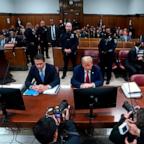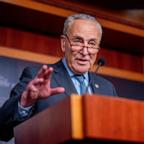Chinese Foreign Ministry Says Chinese Dissident Chen Guangcheng Can Apply to Study Overseas
Clinton points to encouraging signs that diplomatic dispute can be resolved.
May 4, 2012— -- Allowing Chen Guancheng to study abroad is among the encouraging signs from the Chinese that a resolution on the future of the blind human rights activist is within reach, U.S. Secretary of State Hillary Clinton said today.
Addressing the highly charged topic for the first time since arriving Wednesday in Beijing, she said, "We are encouraged by the progress we have seen today but there is more work to do."
Clinton confirmed that Chen, who escaped house arrest April 22 and found temporary refuge at the U.S. Embassy, now says he is certain he wants to go to the United States with his family to study. She said the United States is "heartened" that the Chinese government confirmed that Chen can apply to study abroad.
Chen has expressed his desire to accept an offer from New York University, which said in a statement today that he has "long-established relationships with faculty at the NYU School of Law, and has an invitation to be a visiting scholar at NYU - either in New York or at one of our other global sites. As a visiting scholar, he would be working with our law programs and scholars."
Acknowledging Chen's situation for the first time since news of his daring escape to the embassy made international headlines, the Chinese Foreign Ministry announced earlier in a statement that, "Chen Guangcheng is currently being treated in hospital. As a Chinese citizen, if he wants to study abroad he can go through the normal channels to the relevant departments and complete the formalities in accordance with the law like other Chinese citizens."
The ministry statement was the most positive sign so far from the Chinese, who, a senior U.S. official said, are investigating the abuses Chen has said were committed against him and his family by local Shandong authorities.
There were also other indications the U.S.-brokered deal has not been irreversibly damaged. Clinton said today that U.S. Embassy staffers were able to visit Chen in the hospital. Top-level diplomats had been blocked the day before from entering hospital grounds.
"We will be staying in touch with him," she said today, "and we will continue to engage with the Chinese government at the very highest level."
Secretary Clinton's remarks capped a week of turbulent diplomatic drama. She has been directly involved in negotiations here, U.S. officials said. And observers say the diplomatic crisis has presented the toughest challenge to U.S.-Sino relations in decades.
Chen, who is a self-taught lawyer, had told Congress Thursday that he wants to meet with Clinton face-to-face and he asked to have his "freedom of travel guaranteed" while he looks to leave China with his family and come to the United States.
"I want to meet with the Secretary Clinton," Chen, 40, said over speakerphone as a translator conveyed his words in English. "I hope I can get more help from her. I also want to thank her face to face."
The blind Chinese activist, who generated international headlines ahead of Clinton's attendance at a summit in China this week, phoned into a congressional hearing Thursday to report to Congress the latest details of his predicament.
After a U.S.-brokered deal that allowed him to stay in China, Chen reportedly has begged to depart Beijing on Clinton's plane.
White House press secretary Jay Carney Thursday defended the Obama administration's diplomacy, insisting U.S. officials did not pressure Chen to stay in China when the deal was struck.
"At no point during his time in the embassy did Mr. Chen ever request political asylum in the U.S., and at every opportunity he expressed his desire to stay in China, be unified with his family, continue his education and work for reform in his country," Carney told reporters. "All of our diplomacy was directed at putting him in the best possible position to achieve his objectives."
Carney, however, repeatedly sidestepped questions about how the White House plans to resolve the ongoing crisis and whether the U.S. would support Chen's request for asylum, referring all inquiries to the State Department.
"We are in conversations now -- not we, the State Department folks in Beijing -- and I simply can't give you a moment-by-moment update on that," Carney said.
Chen Guangcheng's 'Mission Impossible' Escape
As controversy swirled in Washington and Beijing, U.S. officials Thursday described Chen's dramatic journey to the U.S. embassy last week as a "mission impossible" operation.
U.S. officials said a rendezvous point was agreed upon several miles from the embassy. Chen was driven by a supporter in one car to meet a second, driven by the Americans. But en route to the location, the Americans realized they were possibly being followed.
In a rush, the two cars met in an alley. Chen was hastily pushed out of his vehicle and pulled in by the Americans before speeding back to the embassy.
U.S. Defends Chen Guangcheng Deal
The satisfaction of his arrival soon gave way to anxious negotiations over his future. As Chen continues to ask to leave China, U.S. officials are defending the agreement they reached with Chen and the Chinese government.
U.S. officials believed they had reached a diplomatic resolution after they escorted Chen to a Beijing hospital where he was reunited with his family. The United States, China and Chen had agreed he would be allowed to remain in China with his family to pursue a course of study at a Chinese university in Tianjin, about 70 miles southeast of Beijing.
U.S. officials said they were guaranteed the ability to monitor Chen's security and given assurances his supporters would not be prosecuted for helping him. Chen was to receive medical treatment for chronic ill health and injuries sustained during his escape.
But within a matter of hours, Chen claimed he had a change of heart.
"I wanted to stay in China in the beginning," he told ABC News. "But now I have changed my mind."
Along with his family, he now wants "to leave for the U.S. on Hillary Clinton's plane."
Speaking to The Associated Press, Chen said the only reason he left the U.S. embassy is because he was told the Chinese would kill his wife if he refused.
In subsequent comments to multiple media outlets, including ABC News, he stepped back from that comment. He said the Chinese government "threatened me that if I don't leave the embassy, they will bring my family back to Shandong."
U.S. officials in Washington and Beijing confirmed that the Chinese conveyed the message that they would not allow his family to remain in Beijing if Chen did not leave. He was informed of this and soon after agreed to the deal and said he was ready to go. State Department spokesman Victoria Nuland said that at no time did a U.S. official speak to Chen about physical or legal threats to his wife and children.
"He was never pressured to leave," U.S. Ambassador Gary Locke said Thursday in Beijing, adding that Chen was asked at one point whether he wanted asylum and he declined.
"He was excited and eager when he made his decision to announce it," Locke said.




